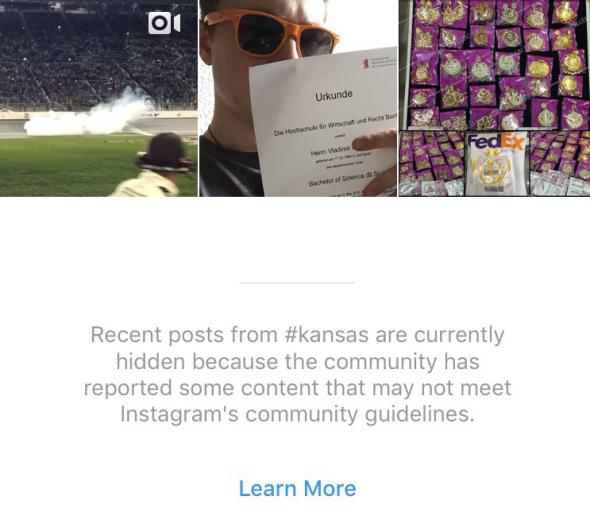If you’re anything like me, you mostly use Instagram to the follow the ordinary adventures of friends and family. Scrolling through my feed, I find lovely photos of foreign destinations, adorable cats, and, of course, elegantly composed plates of food. All that food porn aside, I don’t see much explicit content, but that doesn’t mean it’s not out there. Indeed, Instagram is reportedly full of pornography, despite the site’s best efforts to censor it.
If you want to examine Instagram’s naughty bits (and you’re not willing to actually follow its naughtier users) your best bet may be to look up certain hashtags. The trouble is that those search terms are constantly on the move, partly because Instagram itself is constantly blocking those hashtags from its results. Instagram’s reasons for taking this approach are clear enough: Because it can’t individually review every image posted, it has no way to guarantee that some problematic content won’t find its way to the network. Instead of censoring individual posts, then, it tries to make sure that the most troubling ones are hard to see in the first place.
Refused access to a more explicit vocabulary, many users have reportedly resorted to suggestive emoji. Others have embraced other languages, leading to the temporary pornographic appropriation of the Arabic word for movies. Some, meanwhile, still hew to a more conventional vocabulary, though they’ve occasionally shifted away from clearly objectionable words with bizarre results.
And so we come to the strange state of #kansas. Nick Drewe of The Data Pack recently delved into Instagram’s API to round up the latest batch of hashtags that Instagram has obscured from its search results. Many of the terms have been hidden outright from search results, while others, as Drewe explains, reveal only a limited set of “Top Posts,” presumably to keep tackier content from showing up.
Some that fall into the latter group—including #swole, #snap, and #rack—might well have benign uses, even if they also have more euphemistic qualities. But others will be puzzling to all but the initiated. Good luck, for example, trying to celebrate #easter, #newyears, or #valentinesday on Instagram. Likewise, know that you’ll wind up frustrated if you’re looking for help with #publicrelations via the app. And while it makes sense that they might cover up #asiandick, banning #asia outright seems a little extreme.
And then there’s #kansas, arguably the most peculiar of the bunch. Little in the limited array of accessible top posts for the hashtag explains why the vast majority of other images have been hidden. Instead, as with many of the censored terms that Drewe identifies, we’re treated to a brief note reading, “Recent posts from #kansas are currently hidden because the community has reported some content that may not meet Instagram’s community guidelines.” As Drewe notes, this “message implies that the censorship of these hashtags is only temporary,” but it’s no less mysterious for it.
This is, of course, neither the first time Instagram has censored content nor the only way they’ve done so. In the past, Drewe’s investigations have revealed a handful of predictably banned terms, including #birthdaysex, #jailbait, and that most explicit indicator of explicit content, #pornography. Even then, a few oddballs were scattered in the list, including #iphone and #jamesmotherfuckingfranco, suggesting that there’s nothing new about this trend.
Users and journalists have also identified arbitrary patterns of what does and does not count as problematic by Instagram’s standards. The dynamics are sometimes strangely gendered, and even when they’re not they can be frustrating. (See, for example, Instagram’s removal of The Game’s dick pic, which led Slate’s Christina Cauterucci to name the app one of the greatest villains of 2015.) Though porn purveyors have colonized attempts to push back against the app’s structural sexism on at least one occasion, as Yahoo’s Nora Crotty explains, turning the socially conscious #FreeThe Nipple hashtag into a repository for “so much more than some emancipated areolae,” it’s rarely evident why it censors what it censors.
All of that is to say that this is hardly the first time Instagram has made confusing choices about what is and isn’t acceptable. It’s possible, of course, that “Kansas” is the name of some depraved sex act or that the ban has nothing to do with sex at all, but you’d never know that from the evidence that the site proffers now. Like Facebook, its corporate parent, Instagram’s probably most interested in maintaining its status as a social network by ensuring that the best user-submitted content stands out. But, again like Facebook, Instagram could stand to be clearer about how and why it has its finger on the scales.
